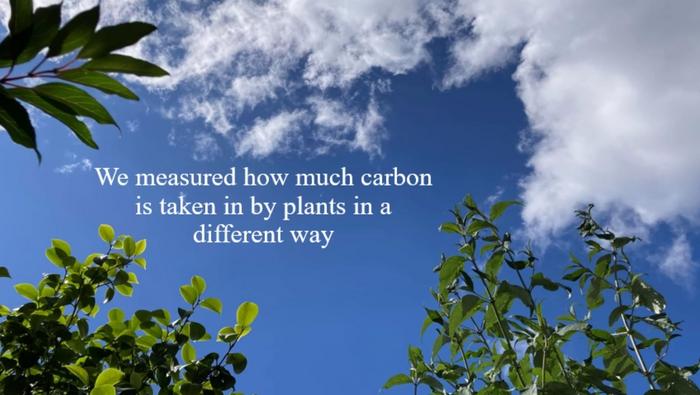The carbon stored globally by plants is shorter-lived and more vulnerable to climate change than previously thought, according to a new study.

Credit: Heather Graven / Imperial College London
The carbon stored globally by plants is shorter-lived and more vulnerable to climate change than previously thought, according to a new study.
The findings have implications for our understanding of the role of nature in mitigating climate change, including the potential for nature-based carbon removal projects such as mass tree-planting.
The research, carried out by an international team led by Dr Heather Graven at Imperial College London and published today in Science, reveals that existing climate models underestimate the amount of carbon dioxide (CO2) that is taken up by vegetation globally each year, while overestimating how long that carbon remains there.
Dr Graven, Reader in Climate Physics in Imperial’s Department of Physics, said: “Plants across the world are actually more productive than we thought they were.”
The findings also mean that while carbon is taken up by plants quicker than thought, the carbon is also locked up for a shorter time, meaning carbon from human activities will be released back into the atmosphere sooner than previously predicted.
Dr Graven added: “Many of the strategies being developed by governments and corporations to address climate change rely on plants and forests to draw down planet-warming CO2 and lock it away in the ecosystem.
“But our study suggests that carbon stored in living plants does not stay there as long as we thought. It emphasises that the potential for such nature-based carbon removal projects is limited, and fossil fuel emissions need to be ramped down quickly to minimise the impact of climate change.”
Using carbon
Until now, the rate at which plants use CO2 to produce new tissues and other parts globally – a measure known as Net Primary Productivity – has been approximated by scaling up data from individual sites. But the sparsity of sites with comprehensive measurements means it has not been possible to accurately calculate Net Primary Productivity globally.
Plants’ productivity has been increasing since the early 1900s and more CO2 is currently taken up by plants than is released back to the air. Researchers know that approximately 30% of CO2 emissions by human activities are therefore stored in plants and soils each year, reducing climate change and its impacts.
However, the details of how this storage happens, and its stability into the future, are not yet well understood.
In this study, radiocarbon (14C) – a radioactive isotope of carbon – was combined with model simulations to understand how plants use CO2 at a global scale, unlocking valuable insights into the interaction between the atmosphere and the biosphere.
Tracking carbon from bomb tests
Radiocarbon is produced naturally, but nuclear bomb testing in the 1950s and 1960s increased the level of 14C in the atmosphere. This extra 14C was available to plants globally, giving researchers a good tool to measure how fast they could take it up.
By examining the accumulation of 14C in plants between 1963 and 1967 – a period when there were no significant nuclear detonations and the total 14C in the Earth system was relatively constant – the authors could assess how quickly carbon moves from the atmosphere to vegetation and what happens to it once it’s there.
The results show that current, widely used models that simulate how land and vegetation interact with the atmosphere underestimate the Net Primary Productivity of plants globally. The results also show that the models overestimate the storage time of carbon in plants.
Role of the biosphere
Co-author Dr Charles Koven, from Lawrence Berkeley National Laboratory, USA, said: “These observations are from a unique moment in history, just after the peak of atomic weapons testing in the atmosphere in the 1960s.
“The observations show that the growth of plants at the time was faster than current climate models estimate that it was. The significance is that it implies that carbon cycles more rapidly between the atmosphere and biosphere than we have thought, and that we need to better understand and account for this more rapid cycling in climate models.”
The authors say the research demonstrates the need to improve theories about how plants grow and interact with their ecosystems, and to adjust global climate models accordingly, to better understand how the biosphere is mitigating climate change.
Co-author Dr Will Wieder, from the National Center for Atmospheric Research, USA, said: “Scientists and policymakers need improved estimates of historical land carbon uptake to inform projections of this critical ecosystem service in future decades. Our study provides critical insights into terrestrial carbon cycle dynamics, which can inform models that are used for climate change projections.”
The work highlights the usefulness of radiocarbon measurements in helping to unpick the complexities of the biosphere. The study’s authors include German physicist Ingeborg Levin, a pioneer in radiocarbon and atmospheric research, who sadly died in February.
Journal
Science
Article Title
Bomb radiocarbon evidence for strong global carbon uptake and turnover in terrestrial vegetation
Article Publication Date
21-Jun-2024



